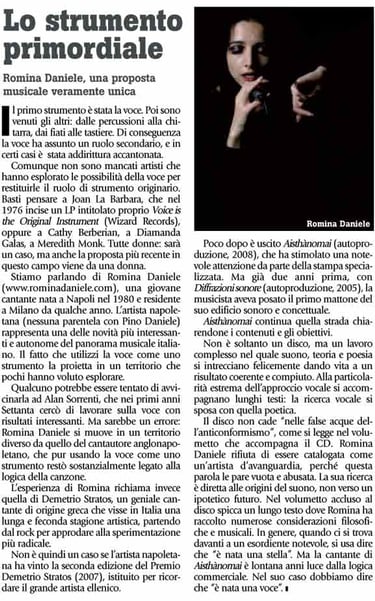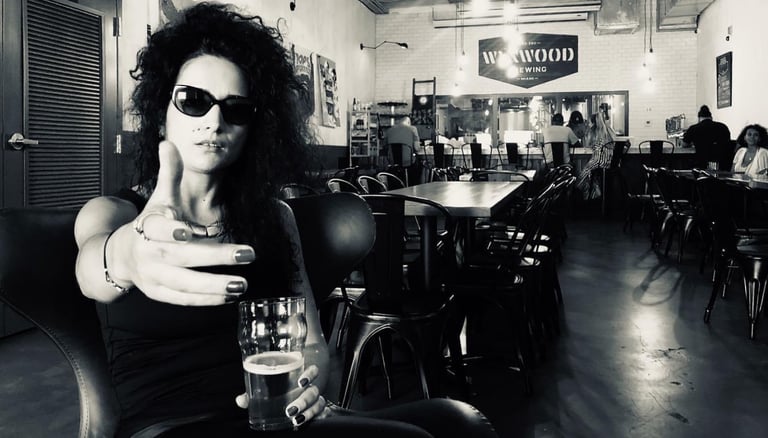
Corsica: The Primordial Instrument
On page 85, the article by Alessandro Michelucci
ARCHIVE: NEWS 2005-2016PRESS REVIEW PRE 2016
OCTOBER 2008
Corsica:
'the Primordial Instrument'
On page 85, by Alessandro Michelucci:
The first instrument was the voice. Then the others came: from percussion to guitar, from wind instruments to keyboards. As a result, the voice has taken on a secondary role, and in some cases has even been set aside.
However, there has been no shortage of artists who have explored the possibilities of the voice to restore its role as an original instrument.
Just think of Joan La Barbara, who in 1976 recorded an LP entitled Voice is the Original Instrument (Wizard Records), or to Cathy Berberian, to Diamanda Galas, to Meredith Monk. All women: it may be a coincidence, but the most
recent proposal in this field also comes from a woman. We are talking about Romina Daniele (www.rominadaniele.com), a young singer born in Naples in 1980 and living in Milan. The Neapolitan artist (no relation to Pino Daniele) represents one of the most interesting and autonomous innovations on the Italian musical panorama. The fact that she uses her voice as an instrument projects her into a territory that few have wanted to explore.
Some might be tempted to compare it to Alan Sorrenti, who in the early Seventies tried to work on the voice with interesting results. But it would be a mistake: Romina Daniele moves in a different territory from that of the Anglo-Neapolitan singer-songwriter, who, despite using the voice as an instrument, remained substantially linked to the logic of the song.
Romina Daniele's experience recalls that of Demetrio Stratos, a brilliant singer of Greek origin who lived a long and fruitful artistic season in Italy, starting from rock and moving on to more radical experimentation.
It is therefore no coincidence that the Neapolitan artist won the the Demetrio Stratos Prize, established to remember the great Hellenic artist.
Shortly afterwards Aisthànomai (2008) was released, it stimulated considerable attention from the specialized press. Already two years earlier, with Diffrazioni sonore (2005), the. musician had laid the first brick of his sonic and conceptual edifice. Aisthanomai continues that path by clarifying its contents and objectives. It is not just a record, but a complex work in which sound, theory and poetry happily intertwine, giving life to a coherent and complete result. The extreme particularity of the vocal approach is accompanied by long texts: vocal research is combined with poetic research.
The album does not fall "into the false waters of non-conformism", as stated in the CD booklet. Romina Daniele refuses to be classified as an avant-garde artist, because this word seems empty and overused to her. Her research is directed at the origins of sound, not towards a hypothetical future. In the small volume included with the album, a long text stands out where Romina has collected numerous philosophical and musical considerations. Generally, when we find ourselves in front of a notable new artist, we say that "a star is born". But the Aischânomai singer is light years away from commercial logic. In her case we must say that "a voice is born".





